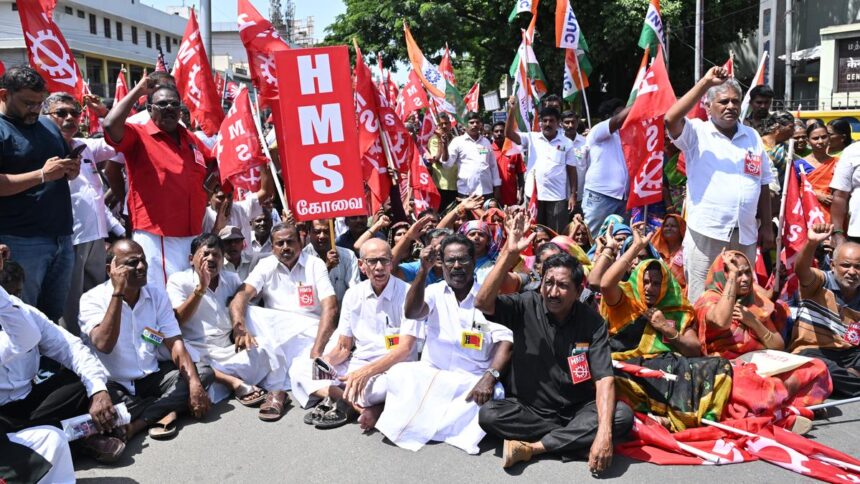
As wholesale onion prices fell by nearly 15% over the past two weeks at Asia’s largest onion market in Lasalgaon, Maharashtra, farmers’ associations have urged both the State and Central governments to intervene immediately. File |
As wholesale onion prices fell by nearly 15% over the past two weeks at Asia’s largest onion market in Lasalgaon, Maharashtra, farmers’ associations have urged both the State and Central governments to intervene immediately.
In a meeting held at the Lasalgaon Agricultural Produce Market Committee (APMC) premises on Monday (July 28, 2025), the Maharashtra State Onion Producers Farmers Association passed multiple resolutions seeking price support and long-term policy measures.
The meeting, chaired by the association’s founding president Bharat Dighole, was attended by farmer representatives, APMC members, and cooperative leaders from across the State. The primary demand put forth was for an assured Minimum Support Price (MSP) of ₹3,000 per quintal – significantly above the current average market rate of ₹1,275 per quintal.
“Farmers are receiving prices far below their production costs, which range between ₹1,800 and ₹2,000 per quintal. This is not just economic exploitation – it’s a disrespect to their year-round labour,” Mr. Dighole said. He added that if the government fails to respond by August 10, farmers would be compelled to launch a Statewide agitation. “We will wait till August 10, 2025. If the government doesn’t care to address our concerns, we will hold a Statewide protest,” he said.
According to the Lasalgaon APMC, the average wholesale price of onions dropped from ₹1,500 on July 16 to ₹1,275 per quintal on July 28, amid fluctuating arrivals. On Monday (July 28, 2025) alone, around 16,300 quintals were auctioned.
Demands raised by farmers
The farmers have raised several demands, including: a 20-year long-term export policy to prevent arbitrary restrictions on onion exports; immediate procurement by the State government at the proposed MSP; establishment of an Onion Fund Corporation; compensation of ₹1,000 per quintal for farmers who sold onions below production cost in recent months; setting up of onion processing units in key producing districts with Central support; subsidised transport and fuel rates; a 10% export subsidy; and buffer stock procurement only through market committees at no less than ₹3,000 per quintal. In case of non-compliance, the association has asked the government to halt procurement through the National Agricultural Cooperative Marketing Federation of India (NAFED) and the National Cooperative Consumers’ Federation of India (NCCF).
Mr. Dighole further said that onion growers should not be treated as “seasonal protestors” and called for a comprehensive, long-term pricing framework for agricultural produce.
A combination of unseasonal rainfall in early May and increased arrivals from other onion-producing states such as Rajasthan, Karnataka, and Madhya Pradesh has impacted supply consistency and pricing. Earlier this month, arrival volumes had dipped by 30% due to adverse weather conditions, temporarily raising prices. However, as inter-State arrivals resumed and demand remained flat, prices fell again, said farmer Nitin Khairnar.
“Despite the Central government’s buffer stock procurement policy and previous efforts to stabilise onion prices, farmers say such schemes lack transparency and fair implementation at the ground level,” he added.
The association has resolved to submit a formal memorandum of its demands to the Union Ministry of Agriculture and Farmers Welfare and the Maharashtra Department of Agriculture. “If no positive action is announced, farmer groups plan to mobilise across major producing districts and stage protests in key cities,” Mr. Dighole said.
Published – July 29, 2025 05:45 pm IST




















